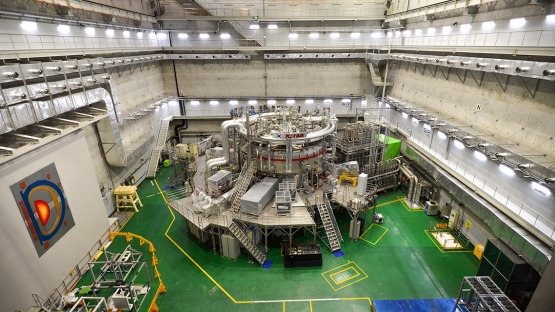An International Atomic Energy Agency (IAEA) team of experts today
completed a review of long-term operational safety of Unit 1 at the
Angra Nuclear Power Plant (NPP) in Brazil. The Pre-SALTO (Safety Aspects
of Long Term Operation) review mission was requested by Eletrobras
Eletronuclear S.A.
The 13-member team, whose review began on 2 May, focused on aspects essential to the safe Long-Term Operation (LTO) of Unit 1, which went into commercial operation in 1985. The operator of the plant, which has two reactors in operation and one under construction, is preparing a license renewal application to extend the operating lifetime of Unit 1 from 40 to 60 years. The application must be submitted by October 2019.
The SALTO team reviewed the plant’s organization and programmes related to LTO, including human resources and knowledge management using IAEA safety standards.
The team observed that the plant has made progress in the field of ageing management and preparedness for safe LTO. The team said management demonstrated a commitment to making further progress and that the LTO project addresses many topics as recommended by IAEA safety standards. The team found the plant staff to be professional, open and receptive to suggestions for improvement.
The team—comprising 11 experts from Argentina, China, the Czech Republic, France, Japan, South Africa and the United States of America as well as two IAEA staff members—identified several good practices and performances that will be shared with the nuclear industry globally, including:
The team provided a draft report to the plant management. The plant and the Regulatory Authority will have an opportunity to make factual comments on the draft. A final report will be submitted to the plant, the Regulatory Authority and the Brazilian Government within three months.
Background
General information about SALTO missions can be found on the IAEA Website. A SALTO peer review is a comprehensive safety review addressing strategy and key elements for the safe long term operation of nuclear power plants. They complement OSART missions, which are designed as a review of programmes and activities essential to operational safety. Neither SALTO nor OSART reviews are regulatory inspections, nor are they design reviews or substitutes for an exhaustive assessment of a plant's overall safety status.
The 13-member team, whose review began on 2 May, focused on aspects essential to the safe Long-Term Operation (LTO) of Unit 1, which went into commercial operation in 1985. The operator of the plant, which has two reactors in operation and one under construction, is preparing a license renewal application to extend the operating lifetime of Unit 1 from 40 to 60 years. The application must be submitted by October 2019.
The SALTO team reviewed the plant’s organization and programmes related to LTO, including human resources and knowledge management using IAEA safety standards.
The team observed that the plant has made progress in the field of ageing management and preparedness for safe LTO. The team said management demonstrated a commitment to making further progress and that the LTO project addresses many topics as recommended by IAEA safety standards. The team found the plant staff to be professional, open and receptive to suggestions for improvement.
The team—comprising 11 experts from Argentina, China, the Czech Republic, France, Japan, South Africa and the United States of America as well as two IAEA staff members—identified several good practices and performances that will be shared with the nuclear industry globally, including:
- The plant has implemented appropriate measures to address environmentally-assisted fatigue of safety significant components for LTO.
- The plant has successfully developed a master list of equipment subject to environmental qualification.
- The plant actively supports educational activities, including an internship programme for potential employees.
- The plant should perform a comprehensive periodic safety review.
- The plant should ensure that ageing of active and short-lived structures and components within the scope of LTO are properly assessed and managed.
- The plant should fully implement a comprehensive environmental qualification programme.
The team provided a draft report to the plant management. The plant and the Regulatory Authority will have an opportunity to make factual comments on the draft. A final report will be submitted to the plant, the Regulatory Authority and the Brazilian Government within three months.
Background
General information about SALTO missions can be found on the IAEA Website. A SALTO peer review is a comprehensive safety review addressing strategy and key elements for the safe long term operation of nuclear power plants. They complement OSART missions, which are designed as a review of programmes and activities essential to operational safety. Neither SALTO nor OSART reviews are regulatory inspections, nor are they design reviews or substitutes for an exhaustive assessment of a plant's overall safety status.































